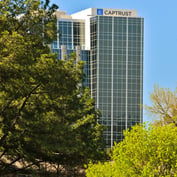DoubleLine CEO and CIO Jeff Gundlach introduced the investment management firm’s newest fund, the Multi-Asset Growth Fund (DMLIX), in a webcast on Tuesday. Known for his acumen as a bond-picker, Gundlach will broaden his focus on equities with his new fund.
Launched in February, the new DoubleLine fund currently has assets under management of about $15 million. Although Gundlach (left) said he wants to move more money into emerging markets and commodities, the Multi-Asset Growth Fund’s assets are now largely in U.S. fixed income, particularly residential mortgage-backed securities (RMBS).
Gundlach said he can foresee as much as 50% to 60% of the fund going into equities, but as of Feb. 28, DMLIX’s funds are allocated 42% in fixed income, 17.5% in equity, 10.5% in real assets and—strikingly—30% in cash. Equities would comprise more than half of the fund only when Gundlach determines that stocks have become very cheap, typically after a big decline. Over full market cycles, the new fund’s average allocation to fixed income would be 60%, equity 35% and real assets such as commodities 15%.
Gundlach, who earned a reputation as a star investor at L.A. money management firm TCW, was shown the door over a year ago in a controversial firing that was followed closely in the business news. A few dozen of his colleagues left with him and started their new fund company, DoubleLine Capital, which accumulated $1 billion in assets in less than three months.
At TCW, Gundlach was chief investment officer for the entire firm, and in that capacity would issue public calls on different markets, including the stock market as well as different bond sectors. At TCW, he also managed a closed-end fund called the TSI Strategic Income Fund (TSI), which was benchmarked against the S&P 500 and had the ability to go into preferred and common stocks and real estate investment trusts (REITs) as well as different bond sectors. He managed it from March 1, 2006, to Dec. 4, 2009, and during that period, TSI delivered a total return of 36.1% versus an S&P 500 loss of -7.1%.
Of the new DMLIX fund's current fixed-income allocations, 31.5% is in U.S. RMBS, 4.5% is in U.S. credit and 6.0% is in emerging fixed income. U.S. equities comprise 13.0% of the fund’s allocation, 3.5% is in international equities, 8.5% is in commodities and 2.0% is in currencies.








 March 15, 2011 at 01:16 PM
March 15, 2011 at 01:16 PM










